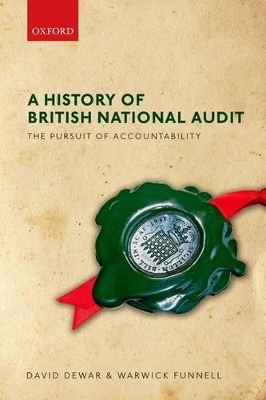
A History of British National Audit:
Oxford University Press (Verlag)
978-0-19-879031-0 (ISBN)
The core theme of the book is the importance of an independent state audit to ensure that the Executive is held accountable to Parliament. Instilling effective financial control and accountability for the use of public funds and the proper conduct of public business has been an incremental process that has taken centuries.
This book provides a detailed history of the forces and personalities involved in the development of public sector audit, including the battles which extended well into the 20th century to establish a public sector audit that was constitutionally and in practice independent from the influence and control of the Executive. It identifies key themes that have emerged and re-emerged in these developments, and the challenges and obstacles faced and overcome over the years to arrive at today's modern audit framework and to establish current principles and practice in accountability to Parliament and the public.
The book charts the movement of public sector audit from a focus on the presentation and accuracy of accounts to the introduction of the added dimension of ensuring that funds are spent only for purposes approved by Parliament and that resources have been used efficiently, effectively and with economy. It explores the seminal relationships of the NAO and its predecessors with the Treasury, spending departments and the Public Accounts Committee; and it deals with the impact of major changes still taking place in the objectives, management and delivery of government programmes and services, including the growing involvement of outside agencies and the private sector. The book reviews the NAO's current achievements, continuing challenges, developments in the range and nature of its work, and future priorities. Importantly, it provides an authoritative source of reference for professionals and academics, while remaining accessible to readers with a more general interest in the developments and issues examined.
David Dewar was educated Leith Academy , Edinburgh. He joined Exchequer and Audit Department (E&AD) in 1953, National Service 1953-55, and re-joined E&AD 1955. He was Chief Auditor in 1966: Deputy Director of Audit in 1973: Director of Audit in 1977: Deputy Secretary in E&AD 1981: Assistant Auditor General NAO in 1984-94. Previously, David served as member of the Auditing Practices Committee of the Consultative Committee of Accountancy Bodies; as member of the Public Sector Liaison Group of the Accounting Standards Committee; and as member of the Council of the Royal Institute of Public Administration. Warwick Funnel is Professor of Accounting and Public Sector Accountability at the University of Kent. His international reputation is based mainly on his public sector and accounting history research. He has published many academic papers in highly ranked journals and published several books across a diverse range of topics, but with the emphasis on the public sector. Books published include Government By Fiat (UNSW Press), Accounting by the First Public Company: The Pursuit of Supremacy (Routledge), Accounting at War (Routledge)
1: A Sense Of History
2: Medieval Beginnings
3: Advance And Retreat in the Financial Supremacy of Parliament
4: The Board of Audit
5: Early Victorian Reform
6: The 1866 Audit Act and the Modern State
7: Audit, Accountability and the Impact of the Two World Wars
8: Post War Strengths and Challenges
9: Audit In The Time of the New Public Management
10: The National Audit Office
11: Recurring Themes and Continuing Change
Appendices
| Erscheinungsdatum | 24.12.2016 |
|---|---|
| Verlagsort | Oxford |
| Sprache | englisch |
| Maße | 162 x 240 mm |
| Gewicht | 596 g |
| Themenwelt | Geschichte ► Teilgebiete der Geschichte ► Wirtschaftsgeschichte |
| Sozialwissenschaften ► Politik / Verwaltung ► Staat / Verwaltung | |
| Wirtschaft ► Betriebswirtschaft / Management ► Rechnungswesen / Bilanzen | |
| ISBN-10 | 0-19-879031-7 / 0198790317 |
| ISBN-13 | 978-0-19-879031-0 / 9780198790310 |
| Zustand | Neuware |
| Informationen gemäß Produktsicherheitsverordnung (GPSR) | |
| Haben Sie eine Frage zum Produkt? |
aus dem Bereich


